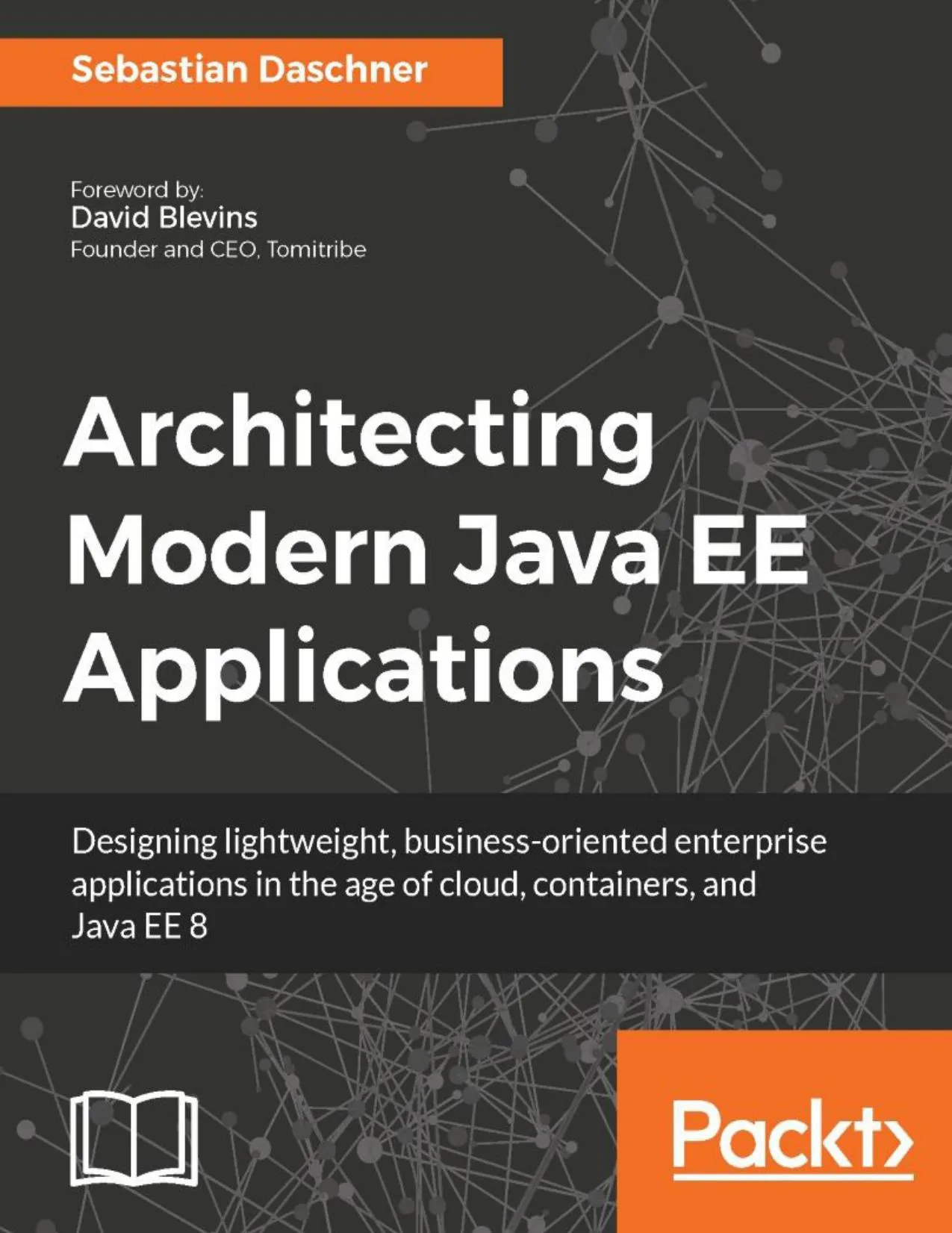Architecting Modern Java EE Applications: Designing lightweight, business-oriented enterprise applications in the age of cloud, containers, and Java EE 8
4.6
بر اساس نظر کاربران

شما میتونید سوالاتتون در باره کتاب رو از هوش مصنوعیش بعد از ورود بپرسید
هر دانلود یا پرسش از هوش مصنوعی 2 امتیاز لازم دارد، برای بدست آوردن امتیاز رایگان، به صفحه ی راهنمای امتیازات سر بزنید و یک سری کار ارزشمند انجام بدینخلاصه تحلیلی کتاب
این کتاب که توسط Sebastian Daschner نگاشته شده، بهعنوان اثری جامع و کاربردی برای معماران نرمافزار، توسعهدهندگان و پژوهشگران حوزه Java EE شناخته میشود. اثر حاضر به بررسی نحوه طراحی معماریهای مدرن و سبک، با تمرکز بر نیازهای کسبوکار و بهینهسازی در بستر فناوریهای نوین همچون cloud و containers میپردازد.
رویکرد کتاب بر ترکیب اصول معماری نرمافزار با تواناییهای Java EE 8 بنا شده است تا حاصل کار، سیستمی منعطف، قابل توسعه و مقاوم در برابر تغییرات سریع محیط کاری باشد. نویسنده ضمن بهرهگیری از تجربه عملی، نشان میدهد که چگونه میتوان از محدودیتهای سنتی عبور کرد و راهحلهای نوآورانه را در معماری سازمانی پیادهسازی نمود.
این اثر شرحی دقیق از چالشها، الگوها و روشهای پیادهسازی را ارائه میدهد و با اتخاذ نگاه راهبردی، پل ارتباطی میان تکنولوژی و کسبوکار ایجاد میکند. بخشهای کتاب علاوه بر آموزش مفاهیم، تجربههای عملی را نیز در قالب مثالهایی از پروژههای واقعی بیان کرده است.
نکات کلیدی و کاربردی
این کتاب مجموعهای از اصول کلیدی را بهطور عملی و تئوریک پوشش میدهد که هر متخصص معماری نرمافزار باید بداند. از جمله این نکات میتوان به انتخاب معماری مناسب بر پایه نیازهای تجاری، بهینهسازی توسعه با Java EE 8، و بهرهگیری ترکیبی از cloud و containers اشاره کرد.
Sebastian Daschner با رویکردی گامبهگام، فرآیند تصمیمگیری معماری را به خواننده آموزش میدهد. این فرآیند شامل ارزیابی نیازها، تطبیق الگوهای طراحی، مدیریت پیچیدگی، و کاهش هزینههای نگهداری سیستم است.
از دیگر جنبههای کاربردی کتاب، تمرکز بر امنیت، مقیاسپذیری و قابلیت استقرار سریع است؛ موضوعاتی که در پروژههای مدرن اهمیت زیادی دارند. نویسنده توضیح میدهد که چگونه با یک معماری سبک و هوشمند میتوان عملکرد سیستم را در شرایط واقعی به حداکثر رساند.
نقلقولهای ماندگار
این بخش شامل برداشتها و گفتههایی است که به شکل الهامبخش، دید عمیقتری نسبت به فلسفه معماری نرمافزار و ارتباط آن با رشد کسبوکار ارائه میکند.
معماری نرمافزار باید نهتنها پاسخگوی نیازهای امروز باشد، بلکه آینده را نیز پیشبینی کند. نامشخص
سبک بودن معماری، قدرت واکنش سریع به تغییرات را به تیم توسعه میدهد. نامشخص
ترکیب دانش تکنولوژیک با بینش کسبوکار، رمز موفقیت در پروژههای بزرگ است. نامشخص
چرا این کتاب اهمیت دارد
با رشد سریع فناوری و تغییر الگوهای کسبوکار، نیاز به معماریهای نرمافزاری مدرن بیش از هر زمان دیگری احساس میشود. این کتاب با تمرکز بر Java EE 8 و بهکارگیری رویکردهای نو در cloud و containers، به معماران و توسعهدهندگان کمک میکند تا سیستمهای خود را مطابق با نیازهای امروزی و آینده طراحی کنند.
اهمیت این کتاب در آن است که راهکارهایی عملی برای گذر از محدودیتهای معماریهای سنتی ارائه میدهد، بدون آنکه اصول بنیادی را نادیده بگیرد. این رویکرد باعث میشود تا سازمانها بتوانند بهطور مستقیم از مزایای فناوریهای روز بهرهمند شوند.
نتیجهگیری الهامبخش
کتاب Architecting Modern Java EE Applications نهتنها یک منبع آموزشی بلکه یک راهنمای عملی برای عبور از مرزهای سنتی طراحی نرمافزار است. خواندن و درک این اثر برای هر متخصصی که به دنبال خلق سیستمهای مقیاسپذیر، امن و به
Analytical Summary
"Architecting Modern Java EE Applications: Designing lightweight, business-oriented enterprise applications in the age of cloud, containers, and Java EE 8" is a pivotal resource for software architects, senior developers, and IT strategists seeking to modernize enterprise systems while maintaining robustness and clarity. Authored by Sebastian Daschner, the book bridges the gap between established Java EE paradigms and the agile, scalable demands of contemporary cloud-native environments.
The work examines how Java EE 8 can be leveraged in concert with containerization technologies to create nimble yet structurally sound enterprise solutions. It contextualizes architecture decisions within modern deployment ecosystems, offering practical frameworks that align business objectives with technological advances.
Daschner’s approach is deeply analytical, exploring not just the "how" but the "why" behind architectural choices. Readers are guided through layered considerations that range from microservice decomposition to maintaining transactional integrity in distributed systems. His authority in the subject matter ensures that concepts are conveyed with precision, backed by real-world deployment patterns.
Key Takeaways
This volume distills a set of repeatable architectural principles and pragmatic techniques tailored for modern enterprise development in the Java EE ecosystem.
One takeaway is the emphasis on designing lightweight solutions that remain business-oriented, avoiding unnecessary complexity while still embracing advanced capabilities like container orchestration.
Another takeaway is the strategic integration of Java EE 8 features—such as JSON-B, JAX-RS improvements, and CDI updates—within continuous delivery pipelines and cloud deployments.
Readers will also gain insight into balancing monolithic application stability with microservice-based adaptability, harnessing the benefits of both worlds without the common pitfalls.
Memorable Quotes
“Architecture is about shaping solutions that serve the business first and technology second.”Unknown
“Java EE 8 isn’t about the past; it’s the foundation for the next generation of enterprise systems.”Unknown
“Lightweight doesn’t mean fragile—it means agile, adaptable, and focused.”Unknown
Why This Book Matters
In an era where technology often advances faster than organizational strategies, the clarity and applicability of "Architecting Modern Java EE Applications: Designing lightweight, business-oriented enterprise applications in the age of cloud, containers, and Java EE 8" stand out.
The book is not merely a technical manual—it is a roadmap for aligning architectural practices with evolving business models. The focus on business-oriented design ensures that solutions are not only technologically sound but also economically and strategically viable. Readers gain actionable insights into making architectural trade-offs that safeguard scalability, maintainability, and stakeholder alignment.
Information on publication year, awards, or recognitions is unavailable due to no reliable public source, but the enduring relevance of its content continues to influence enterprise development discussions.
Inspiring Conclusion
"Architecting Modern Java EE Applications: Designing lightweight, business-oriented enterprise applications in the age of cloud, containers, and Java EE 8" serves as a cornerstone text for those committed to advancing enterprise development.
Its authoritative treatment of Java EE 8, combined with modern deployment strategies, makes it an indispensable companion for professionals eager to thrive in the era of cloud-native systems. By embracing the principles and methodologies outlined in this book, readers can architect solutions that not only meet today’s demands but also anticipate tomorrow’s challenges.
I invite you to read, share, and discuss the insights contained within, ensuring that the dialogue around enterprise architecture remains forward-looking, business-focused, and technically sound.
دانلود رایگان مستقیم
شما میتونید سوالاتتون در باره کتاب رو از هوش مصنوعیش بعد از ورود بپرسید
دسترسی به کتابها از طریق پلتفرمهای قانونی و کتابخانههای عمومی نه تنها از حقوق نویسندگان و ناشران حمایت میکند، بلکه به پایداری فرهنگ کتابخوانی نیز کمک میرساند. پیش از دانلود، لحظهای به بررسی این گزینهها فکر کنید.
این کتاب رو در پلتفرم های دیگه ببینید
WorldCat به شما کمک میکنه تا کتاب ها رو در کتابخانه های سراسر دنیا پیدا کنید
امتیازها، نظرات تخصصی و صحبت ها درباره کتاب را در Goodreads ببینید
کتابهای کمیاب یا دست دوم را در AbeBooks پیدا کنید و بخرید
1007
بازدید4.6
امتیاز50
نظر98%
رضایتنظرات:
4.6
بر اساس 0 نظر کاربران
"کیفیت چاپ عالی بود، خیلی راضیام"
Questions & Answers
Ask questions about this book or help others by answering
No questions yet. Be the first to ask!


